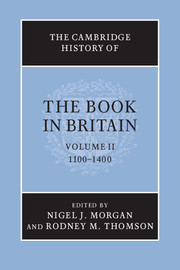Book contents
- Frontmatter
- Preface
- The roles of books
- Book production
- Readership, libraries, texts and contexts
- 9 Library catalogues and indexes
- 10 University and monastic texts
- 11 Law
- 12 Books for the liturgy and private prayer
- 13 Compilations for preaching and Lollard literature
- 14 Spiritual writings and religious instruction
- 15 Vernacular literature and its readership
- 16 History and history books
- 17 Archive books
- 18 Scientific and medical writings
- I The introduction of scientific texts into Britain, c. 1100–1250
- II University books and the sciences, c.1250–1400
- 19 Music
- 20 Illustration and ornament
- List of abbreviations
- Bibliography
- Photo credits
- General index
- Index of manuscripts
- Plates 1
- Plates 2
- References
II - University books and the sciences, c.1250–1400
from 18 - Scientific and medical writings
Published online by Cambridge University Press: 28 November 2008
- Frontmatter
- Preface
- The roles of books
- Book production
- Readership, libraries, texts and contexts
- 9 Library catalogues and indexes
- 10 University and monastic texts
- 11 Law
- 12 Books for the liturgy and private prayer
- 13 Compilations for preaching and Lollard literature
- 14 Spiritual writings and religious instruction
- 15 Vernacular literature and its readership
- 16 History and history books
- 17 Archive books
- 18 Scientific and medical writings
- I The introduction of scientific texts into Britain, c. 1100–1250
- II University books and the sciences, c.1250–1400
- 19 Music
- 20 Illustration and ornament
- List of abbreviations
- Bibliography
- Photo credits
- General index
- Index of manuscripts
- Plates 1
- Plates 2
- References
Summary
The emergence of the libri naturales of Aristotle as the core of the Arts curriculum at the English universities in the thirteenth century created the need for texts of these works produced in the university setting in considerable numbers. This development was of profound importance to the intellectual life of western Europe as a whole, but can only be properly understood in terms of the relationship between the manuscripts produced and the classroom teaching of the libri naturales in particular times and places. The collection of Aristotle’s works on natural science known as the Corpus vetustius – so-called by modern scholars to distinguish it from the later collection known as the Corpus recentius, based on Greek–Latin translations – was formed with translations both from Arabic and from Greek. Those in BAV, ms. Urb. lat. 206 are typical, consisting of Physics, De caelo, De generatione et corruptione, Meteora, De anima, De memoria, De somno, De sensu et sensato, De differentia spiritus et animae of Qusta ben Luqa, De morte et vita, De causis attributed to Avendauth, and the De plantis of Nicholas of Damascus. Most of the thirteenth-century English manuscripts of this Corpus vetustius contain not only the texts themselves but what has been identified as the ‘Oxford gloss’, written in the margins and between the lines of the text, and based in three cases on part on the commentary written on many of the works by Adam of Buckfield (c.1200–after 1279).
- Type
- Chapter
- Information
- The Cambridge History of the Book in Britain , pp. 453 - 462Publisher: Cambridge University PressPrint publication year: 2008

